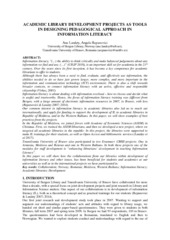Academic Library Development Projects as Tools in Designing Pedagogical Approach in Information Literacy
Chapter, Peer reviewed
Accepted version

Åpne
Permanent lenke
https://hdl.handle.net/1956/20945Utgivelsesdato
2019Metadata
Vis full innførselSamlinger
Originalversjon
In: Knezevic; WBIMLC 2019 Proceedings. Freedom, Accuracy and Truth, 2019. Limerick Institute of Technology p. 47-52Sammendrag
Information literacy, "(…) the ability to think critically and make balanced judgements about any information we find and use. (…)” (CILIP 2018), is an important skill set for academia in the 21st century. Over the years since its first inception, it has become a key competence for academic librarians to offer to students. Although there has always been a need to find, evaluate, and effectively use information, the abilities needed to do so have just grown larger, more complex, and more important in the information and communication technology (ICT) environment. There is also a shift towards broader contexts, to connect information literacy with an active, effective and responsible citizenship (Virkus, 2003). Information literacy is about dealing with information overload – how to choose and decide what is useful and trustworthy. Hence, the focus of information literacy training was different from Bergen, with a large amount of electronic information resources in 2007, to Brasov, with less (Repanovici & Landøy 2007; 2014). Our common interest in information literacy in academic libraries also led us to reach out internationally, and apply for funding to support the development of IL in academic libraries in Republic of Moldova, and in the Western Balkans. In this paper, we will show examples of best practices from the projects. In the Republic of Moldova, we joined forces with Academy of Economic Sciences (ASEM) in Chisinau. First, we trained the ASEM librarians, and then we developed a new project, where we targeted all academic libraries in the republic. In this project, the libraries were supported to make IL trainings for their students, as well as Open Access and bibliometric services (Landøy et al 2017). Transilvania University of Brasov also participated in two Erasmus+ CBHE-projects: One in Armenia, Moldova and Belarus and one in Western Balkans. In both these projects one of the modules for staff development is “enhancing librarians’ development in teaching Information Literacy”. In this paper we will show how the collaborations from our libraries within development of information literacy and other issues, has been beneficial for students and academics at our universities as well as in the international projects we have participated in.